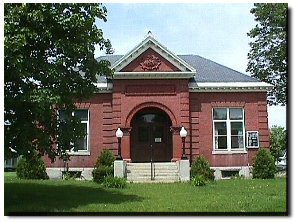
Maine libraries are creating a COVID-19 archive — and they need your stories for it
One hundred years from now, when future Mainers decide to research what happened during the coronavirus pandemic of 2020, what information will they find? What photos and artwork will they see? What kinds of documents will they come across? Whose stories will they read?
A number of Maine libraries are hoping to create an archive of all those things by asking Mainers to contribute their stories, photos, artwork and other documents about their experience during the pandemic. The goal is to create a large-scale picture of how the state got through the pandemic — the bad, the good and everything in between.
Presently, 15 libraries statewide from Portland to Fort Fairfield have active COVID-19 community archive projects, while the rest are working on getting their collections efforts up and running. The Maine State Library, through grant funding from the CARES Act, was able to purchase software that each participating library can use to host their collections digitally, and is acting as a clearinghouse for each individual library’s archive.
Greta Schroeder, director of the Thompson Free Library in Dover-Foxcroft, is part of a group of around 40 Maine libraries that have been meeting weekly to collaborate on the best ways to gather items for the archive.
“[Archiving is] something that not every library has experience with, so we’re all learning together and collaborating,” Schroeder said. “Everybody has a different approach, and different specific stories and needs within their own community, so it’s a very neat mix of people.”
Schroeder said that right now, most of the collecting effort has been done by the librarians and archivists at each town’s library, whether it’s clipping newspaper stories, gathering photos, or soliciting items from people in their communities.
“People don’t write handwritten letters or keep diaries like they did 100 years ago, so we have to be a little more proactive in terms of making sure we have a record of the things that will tell us what life is like at this time,” Schroeder said. “It’s a lot of reaching out to people, asking questions, giving them prompts. Everybody has a story. We just have to get it out of them.”
At the Bangor Public Library, staff have come up with the Pandemic Postcard Project, launched earlier this summer, which asks people to send a 4×6 inch postcard decorated with an image inspired by one of five prompts, like what sort of unexpected benefits have come from being quarantined, or what people have learned about themselves during lockdown. The library has also included paper forms with all library books that are checked out, which people can fill out with their stories. They can also submit items directly online on the library’s website.
The University of Maine’s Fogler Library also is collecting stories and images from UMaine students, faculty, staff and alumni, for inclusion in its own COVID-19 archive, many of which are already available to view online. UMaine is one of many colleges and universities nationwide that are working on similar archive projects.
UMaine archivist Matthew Revitt, who is spearheading the university’s COVID-19 archive, said he’s been collecting things like revised syllabi from classes that went online, screenshots of web pages and emails from various UMaine academic and administrative departments, as well as personal stories from alumni, with the help of UMaine’s Alumni Association.
“I wanted to be able to show the broad response from the university itself, and then how individual departments adapted, as well ordinary people,” Revitt said. “We want to get a kind of big picture of what happened, so that people in 10, 15, 100 years time that are researching this moment in history can really get a sense of what life was like, and how the university at all levels reacted.”
Creating such an archive is important not least because of the fact that the historical record from the 1918 influenza pandemic, the last global pandemic of such magnitude, often has large gaps in it in terms of raw data, press coverage and general storytelling. Back in 1918, with World War I still raging, both the Allied and Central powers minimized the scope of the illness and mortality rates to maintain morale, despite the fact that more than 5,000 people in Maine and more than 17 million globally are believed to have died from it.
For now, the COVID-19 archive projects are open-ended, and will accept items for as long as they continue to be submitted. Schroeder said the COVID archive effort will not only hopefully create a historical record of the pandemic for Maine, but also will help libraries statewide be better equipped to record and archive stories and information in general, about a wide array of local, statewide and national events.
Already, the Thompson Free Library is part of a collaboration with libraries in Skowhegan, Pittsfield, Newport and Hartland called Heart of Maine Community Stories, which will host the COVID-19 archive and any future archives that may come together around a specific topic or event.
“The pandemic is what brought us all together, but now we’re building a structure that will support us into the future, so we can continue this kind of work,” Schroeder said. “It feels like this is a really big, historical moment in so many ways, and there are a lot of things happening in the world that are really important to capture, today and going forward.”